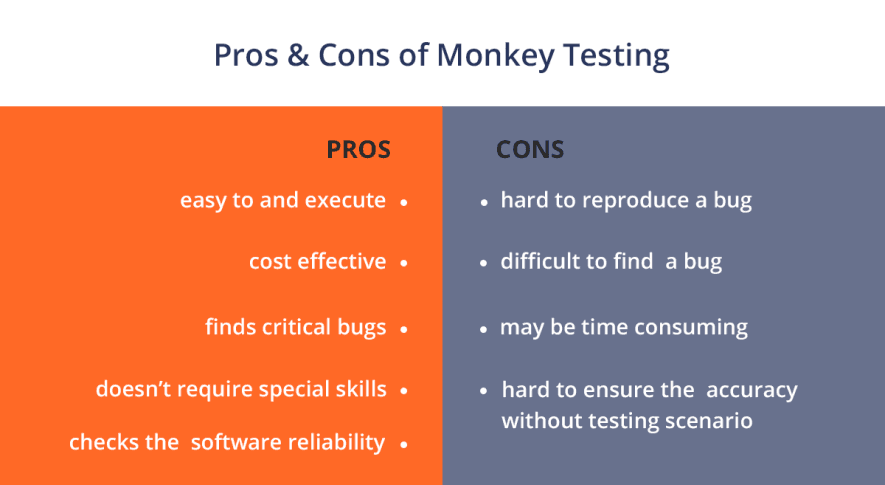- QATestLab Blog >
- QA Basics >
- Types of Software Testing >
- What is Monkey Testing?
Note: this article was updated in July 2019
Is it right to trust to chance, especially when it comes to your job? If to talk about software testing, you hardly know where a bug may come from so it would not be a mistake to wait for some luck. But, in some cases, testers may flip the coin using Monkey Testing.
The idea of Monkey testing takes its start from a principle that the more multiplied actions of search are, the bigger is the probability of detecting the important issue. Like the group of monkeys who randomly press the buttons: more monkeys, more chances they will do something right.
Fortunately, in our case, we rely on qualified testers, and if to multiply their efforts to maximum, the probability of a successful outcome is increasing. That is why the monkey testing tool is reasonable to be used but with some amendments. Let’s review this type of testing in details and see how to use it properly and is it worth to be applied at all.
What the Monkey’s Work is?
Monkey testing is a perfect choice when circumstances dictate their rules and do not allow to dedicate enough time to write and perform a complete test plan. Testers execute this testing by random inputs performing unit tests.
Monkey testing challenges the software with various indefinite inputs to track the behavior of a program with different data. This method can be applied both for desktop and mobile platforms. Due to the use of testing tools, this random testing can be automated, which reduces the needed efforts much more. Look at the monkey testing with example: in course of testing the log-in parameters, testers enter “junk” characters (#$%^^&) as input data and watch how the system responses.
Types of Monkey Testing
This testing can be performed in three different ways:

Dumb monkey tests are executed when:
- testers have no complete understanding of the product and its specifics;
- testers do not know if the input data is valid;
- it is not able to define the capability of the system;
- it finds fewer bugs than smart testing but may detect a bug which is hard to find.
In this case, the testing is truly random. PM assigns the task for a tester to perform it intuitively not being well aware of the system’s peculiarities. Here the actions of a tester can be very similar to users’ behavior when a consumer has no experience of using the program.
Smart monkey tests:
- testers have an understanding of the system and its functionalities;
- it is known exactly whether the input data is valid or not;
- the detected errors can be defined and clearly reported.
Smart monkey testing enables testers to track the behavior of the system when they know which data is valid and which is not. QA specialists can see the expected result in case of inputting the valid data and examine how the system handles the invalid one.
Brilliant monkey tests
Here the tester perfectly knows what element is under testing and clearly understands what task is assigned by PM or Team Lead. Also, tester realizes the specifics of data which is entered to test the program.
Monkey Testing: Advantages and Disadvantages
Like any other kind of testing, monkey testing has its advantages and disadvantages. Of course, they can vary depending on the features of the project, but let’s consider the main ones:

Conclusion on Monkey Testing
Everyone wants to perform difficult tasks with minimum efforts. Monkey Testing technique is reasonable to use due to its simple procedure of execution by random inputs, and it is a good way to check the product. Random actions can also detect the essential defect and save the resources on composing a detailed and strict test plan. However, as in each type of testing, the success of a monkey method depends on how clear the understanding of a product is, and how accurate the input information is provided. That is why do not bet everything on luck, but prepare even for random testing using QATestLab tips.
Learn more from QATestLab
Related Posts:
- Main Types of Software Testing or Testers-Cats
- The Main Goal of Acceptance Testing
- Classification of Software Testing Kinds








No Comments Yet!
You can be the one to start a conversation.